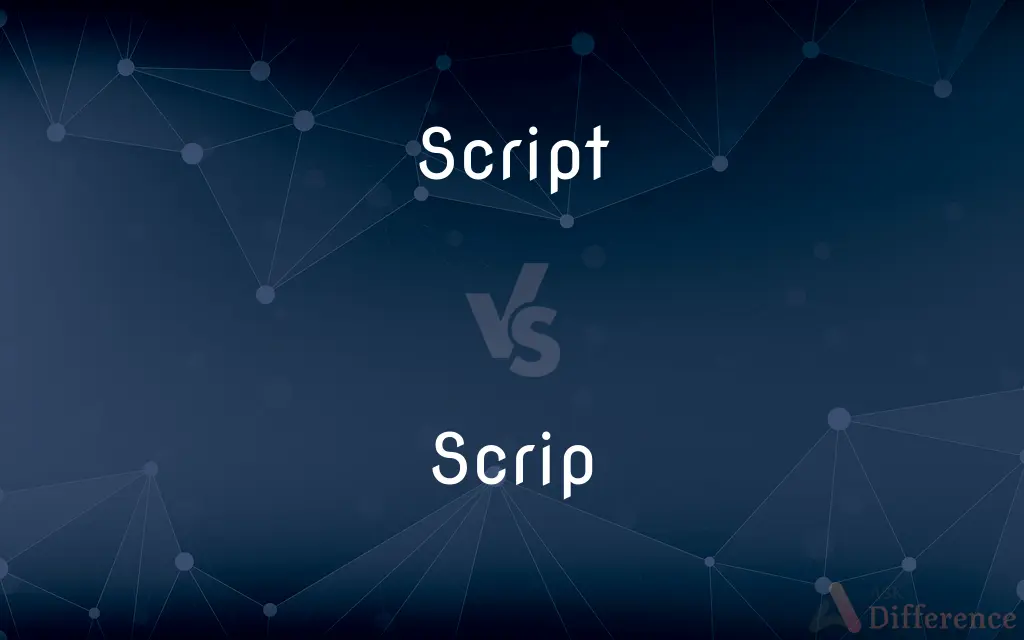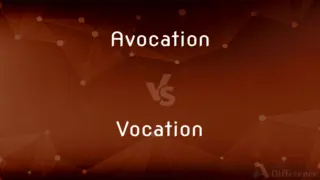Script vs. Scrip — What's the Difference?
By Urooj Arif & Maham Liaqat — Updated on March 12, 2024
Script is a written text for a play, movie, or broadcast, while scrip is a certificate representing a right or receipt, often used instead of currency.

Difference Between Script and Scrip
Table of Contents
ADVERTISEMENT
Key Differences
A script is a detailed written outline used in the production of plays, movies, television shows, and radio broadcasts. It includes dialogue, stage directions, and sometimes camera angles, serving as a blueprint for performances. Scrip, on the other hand, is a document that represents some type of right, such as ownership, credit, or a claim on goods, often issued by a company or government.
Scripts are essential in the performing arts and entertainment industry, guiding actors, directors, and crew through the production process. They are crafted by scriptwriters who focus on narrative structure, character development, and dialogue. Scrip, however, is used in financial and commercial contexts, representing a temporary substitute for money or a certificate that can be exchanged for goods and services.
While scripts are dynamic, evolving through revisions during pre-production and production phases, scrip is generally static, representing a fixed value or claim at the time of issuance. Scripts engage creative talents and technical skills to bring stories to life, whereas scrip is a practical tool for transactions, incentives, or as a means to raise funds or distribute goods.
The creation of a script is a creative process that involves drafting, revising, and often collaborating with directors, producers, and sometimes actors. Scrip issuance, however, is a financial or organizational decision, often made to address specific needs such as currency shortages, employee incentives, or loyalty programs.
Scripts and scrip, while entirely different in purpose and application, both serve as crucial tools in their respective fields—scripts in the creation and production of media content, and scrip in facilitating commerce, ownership, and entitlements in various scenarios.
ADVERTISEMENT
Comparison Chart
Definition
Written text for plays, movies, or broadcasts
Certificate representing a right or receipt, used instead of currency
Purpose
Guide production of entertainment content
Represent ownership, credit, or claim on goods or services
Context
Performing arts and entertainment
Financial and commercial transactions
Nature
Dynamic, evolves with revisions
Generally static, representing fixed value or claim
Application
Essential in creating and executing media content
Used for transactions, incentives, or as currency substitute
Compare with Definitions
Script
A manuscript or document for a play, movie, or broadcast.
The director praised the script for its sharp dialogue.
Scrip
A certificate representing a right to payment or goods.
The company issued scrip to employees as a bonus.
Script
A blueprint for production in entertainment.
The script's final draft was ready for shooting.
Scrip
Temporary substitute for currency.
During the shortage, local businesses accepted scrip.
Script
A guide for performers and crew in media production.
The script outlined an elaborate opening scene.
Scrip
Document used in lieu of money.
Scrip was used in the coal mines for buying at the company store.
Script
Basis for storytelling in media.
The script underwent several changes before final approval.
Scrip
A tool for trade or exchange.
The fundraising event used scrip for transactions at booths.
Script
The written text including dialogue and instructions.
Actors often contribute to script revisions.
Scrip
A form of credit or voucher.
Customers earned scrip with each purchase for future discounts.
Script
Handwriting.
Scrip
(archaic) Small change.
Script
A style of writing with cursive characters.
Scrip
A scrip (or chit in India) is any substitute for legal tender. It is often a form of credit.
Script
A particular system of writing
Cuneiform script.
Scrip
A form of money issued by a local government or private organization.
Script
A style of type that imitates handwriting.
Scrip
A certificate or receipt used to redeem a credit.
Script
The matter set in this type.
Scrip
Stock, as issued by companies.
Script
The text of a play, broadcast, or movie.
Scrip
The stock of a particular company.
Script
A copy of a text used by a director or performer.
Scrip
Chiefly British A fractional share of stock issued to existing shareholders.
Script
(Law) The original of a legal instrument, as opposed to a copy.
Scrip
A wallet, small satchel, or bag.
Script
(Computers) A simple program in a language that the computer must convert to machine language each time the program is run.
Scrip
A small medieval bag used to carry food, money, utensils etc.
Script
To prepare (a text) for filming or broadcasting.
Scrip
A scrap of paper.
Script
To arrange, direct, or control (an event or a person) as if supplying a script
"the brilliant, charming, judicial moderate scripted by his White House fans" (Ellen Goodman).
Scrip
A document signifying a power to obtain a specified acreage of public land.
Script
(Computers) To write (code) for a program.
Scrip
A voucher or token coin used in place of legal tender for payment of wages.
Script
A writing; a written document.
Scrip
A substitute for legal tender that is produced by a local government or a private organization.
Script
Written characters; style of writing.
Scrip
A share certificate.
Script
(typography) Type made in imitation of handwriting.
Scrip
A medical prescription.
Script
An original instrument or document.
Scrip
A small bag; a wallet; a satchel.
And in requital ope his leathern scrip.
Script
(countable) The written document containing the dialogue and action for a drama; the text of a stage play, movie, or other performance. Especially, the final form used for the performance itself.
Scrip
A small writing, certificate, or schedule; a piece of paper containing a writing.
Call them generally, man by man, according to the scrip.
Bills of exchange can not pay our debts abroad, till scrips of paper can be made current coin.
Script
(computing) A file containing a list of user commands, allowing them to be invoked once to execute in sequence.
Scrip
A preliminary certificate of a subscription to the capital of a bank, railroad, or other company, or for a share of other joint property, or a loan, stating the amount of the subscription and the date of the payment of the installments; as, insurance scrip, consol scrip, etc. When all the installments are paid, the scrip is exchanged for a bond share certificate.
Script
(psychology) A behavioral script; sequence of actions in a given situation.
Scrip
Paper fractional currency.
Script
(linguistics) A system of writing adapted to a particular language or set of languages.
Scrip
A certificate whose value is recognized by the payer and payee; scrip is not currency but may be convertible into currency
Script
(informal) prescription for drugs or medicine
Script
(transitive) To make or write a script.
Script
(transitive) To devise, concoct, or contrive.
Script
A writing; a written document.
Script
Type made in imitation of handwriting.
Script
An original instrument or document.
Script
Written characters; style of writing.
Script
A written version of a play or other dramatic composition; used in preparing for a performance
Script
Something written by hand;
She recognized his handwriting
His hand was illegible
Script
A particular orthography or writing system
Script
Write a script for;
The playwright scripted the movie
Common Curiosities
Can scripts change during production?
Yes, scripts often undergo revisions based on creative decisions or practical considerations.
What is the main use of a script?
To guide the production and performance of plays, movies, and broadcasts.
Who creates scripts?
Scriptwriters or screenwriters, often in collaboration with directors and producers.
How is scrip typically used?
As a substitute for money, or to represent credit or entitlement to goods and services.
What does scrip represent in financial contexts?
It can represent ownership, a claim on assets, or a right to payment.
How do scripts contribute to a film's success?
A well-written script is foundational, shaping compelling narratives and characters.
What historical uses has scrip had?
Scrip has been used in lieu of currency during economic crises, in closed economies like company towns, or in loyalty programs.
Why would a company issue scrip?
To manage currency shortages, provide incentives, or facilitate internal transactions.
Is a script the same as a screenplay?
Yes, in the context of movies and television, a script is often referred to as a screenplay.
Can anyone use scrip?
Scrip usage is typically limited to specific contexts or agreements between issuers and users.
Are scripts only used in entertainment?
Primarily, though the concept of scripting applies to any structured narrative or instruction set.
Can scrip be exchanged for cash?
It depends on the terms set by the issuer; sometimes it can be exchanged or redeemed for goods, services, or cash.
Do scripts and scrip have anything in common?
Beyond involving written documents, they serve very different purposes in their respective fields.
What makes a good script?
Engaging dialogue, strong character development, and a compelling narrative structure.
How is scrip valued?
Its value is determined by the issuer, based on the represented credit, goods, or services.
Share Your Discovery

Previous Comparison
Breeches vs. Britches
Next Comparison
Avocation vs. VocationAuthor Spotlight
Written by
Urooj ArifUrooj is a skilled content writer at Ask Difference, known for her exceptional ability to simplify complex topics into engaging and informative content. With a passion for research and a flair for clear, concise writing, she consistently delivers articles that resonate with our diverse audience.
Co-written by
Maham Liaqat













































